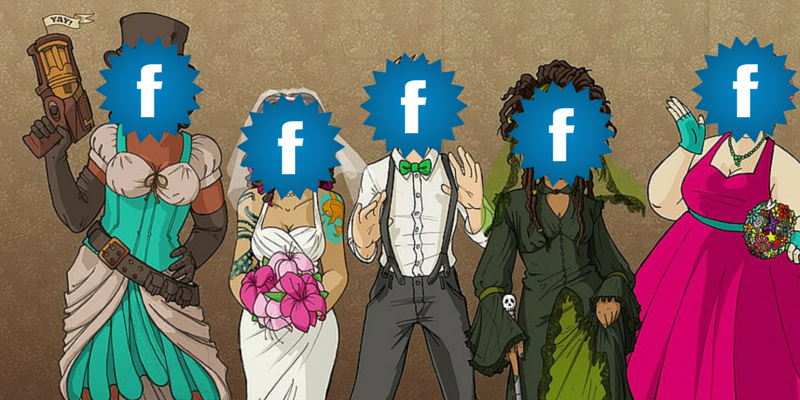
Weeks ago, The Atlantic published an article called What Blogging Has Become. Theoretically the article was about Medium.com, but really… it was just about the reality that digital publishers are dealing with these days. The reality called Facebook:
In August 2013, Facebook began sending many more readers than it ever had before to what it called “quality publishers” by promoting links from their pages to users’s News Feed. Now Facebook can refer more traffic than anyone else — whole leaping barrelfuls of it, as far as news organizations are concerned — and news organizations looking for growth have come to rely on it. An October 2014 analysis claimed Facebook drove nearly 25 percent “of overall traffic to sites,” which seems low to me. Justin Smith, CEO of Bloomberg Media, worried Wednesday that “the list is a lot longer than is publicly known of those that have Facebook delivering half to two-thirds of their traffic right now.”Imagine half to two-thirds of the thing that makes your revenue possible coming from anywhere. That’s what centralization has done. The glittering dream of ten thousand bloggers, each with their own URL and each remixing the news for their own audience — that curious ideal pitched between libertarianism and progressivism — has led to this.
This utter reliance of publishers on a couple big distribution engines — that’s just the present! Looking forward, John Herrman, a BuzzFeed alum and now the editor of The Awl, predicts that news sites will grow ever more addicted to the traffic that social apps will provide them. News outlets have already been forced to sacrifice control over distribution; now they’ll sacrifice control over publication too. Facebook today, already, now, wants news orgs to publish video directly to their Facebook pages…
And once these news brands, BuzzFeed and The Atlantic and The New York Times give in to apps, and once internal editorial structure reorganizes itself and the whole state of affairs becomes normalized for eight or nine months, some 24-year-old assistant editor who’s used Snapchat since high school and who majored in computer science and public policy will walk home and think to themselves (to quote Herrman again): “What was even the point of websites? Were they just weird slow apps with nobody in them?”
Back in the present, here’s New York Times CEO Mark Thompson earlier this month, on whether the venerable Gray Lady is considering publishing video directly to Facebook:
“My starting assumption is that … you’re better off playing the game. […] Each circumstance has to be considered on its own merit. […] There’s a danger, by the way, of staying outside the party.”
Facebook’s great attentional party!
“What was even the point of websites? Were they just weird slow apps with nobody in them”… this quote from a fictional 24-year-old assistant editor should be enough to shock even the most old school web publishers out of complacency. If you think anyone cares about your adorable website, that .com relic of bloggerdom, with the newest posts on top of the homepage and its assumptions about people coming to you, then I don’t think you’re watching the horizon enough.
Entire media careers are being built on social platforms. Sure it’s scary to think of putting all your eggs in some content farm’s basket (Facebook, Instagram, Youtube, Vine, Medium… doesn’t matter), but ultimately smart publisher and content folks must go where the eyeballs are. And in fact ideally, go where the eyeballs will be in the future.
People are getting their web content in very different ways than they were even just two years ago. I don’t think there’s really any point in placing a value judgment on it. For better or worse, it doesn’t matter. It’s happening. No, it’s already happened.



So what does that mean for fostering community and constructive dialog? I ask because I find the greatest strength of the Empire is that (through the mighty and continued effort of staff) it is a place where people celebrate different life choices and talk about them in a thoughtful manner. People don’t come to Facebook or Twitter with that same mindset and it shows (it can get -ugly- over there). Isn’t Facebook where most of the moderation drama comes from these days?
I don’t expect anyone to have a ready answer to my concern, mind you, just worrying aloud I guess.
Facebook absolutely is where the biggest moderation drama comes from, but the awesome thing is that it also has two moderator dream tools I’ve been wanting for 15 years: HIDE and BAN.
When you hide a FB comment, it’s only seen by the commenter and their FB friends. This means that as far as they’re concerned, their rant/spam has been broadcast… meanwhile, none of the other page followers see the comment. The ranter/spammer feels like they’ve had their say, but no one else has to listen to it. When we moderate comments on the blogs, the commenters immediately notice that they’ve been moderated, and then register their outrage that they’re being SILENCED. Facebook allows for quiet silencing that incites no outrage.
And of course FB banning is hugely powerful. Sure, WordPress allows you to ban someone by IP or email address, but those are easy for commenters to work around. Since FB comments are tied to people’s FB accounts, when their FB account gets banned… they are BANNED. We drop-kick people all the time: https://offbeatempire.com/acculturating
Another advantage of Facebook comments is that they’re fleeting. Whereas blog post comments stay with a post in perpetuity, Facebook comments drift into the ether after about a day. Three years ago, this was HUGELY FRUSTRATING for me. Here in 2015, I’m stoked about it… it means that the low-quality comments aren’t hosted on my platform, and they drift away quickly.
Moral of the story? The readers who want to have thoughtful, constructive dialog continue to comment on the blogs. The masses (who include ranters, spammers, and your aunt marge) aren’t invested enough to, like, click to the blog to type their name and email omgggg, so they just comment on FB, where their rambling floats away quickly… with the added advantage of their rambles driving up our Facebook engagement, so our posts are shown to more people.
I’ll stop now, but I could go on for days…
thank you for that awesome response. well said.